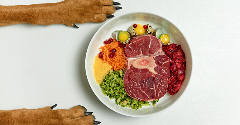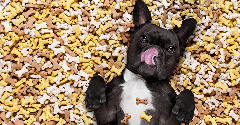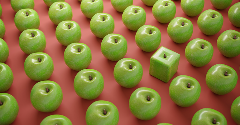News
Mars looks to pet food as ‘inspiration’ for regenerative push
26 May 2025Mars is leveraging pet owners' passion for nutrition to raise awareness of how regenerative approaches to farming can help restore soil health.
People love their pets. So much so that more than half (52%) say they research the ingredients in the pet food they buy, according to a survey commissioned by pet food company James Wellbeloved.

Soil has become a focus for food manufacturers in recent months as a global crisis continues to impact the production of crops and put food and feed security at risk. Soil also stores carbon (crucial to limiting global heating) and is home to nearly 60% of all species.
But every year, the world loses billions of tonnes of topsoil to overgrazing, deforestation, pollution, and other threats.
“[T]he health of our soil underpins the quality of our food – whether it’s feeding people or our pets,” explained Joseph Gridley, chief executive officer at Soil Association Exchange, a platform designed to support and transform sustainable farming in the UK.
The organisation is involved in a Mars-led initiative in the UK to support farmers in adopting regenerative practices and verifying the impact of these changes on soil health, biodiversity, and resilience.
Connection between farming and food for pets
The Beloved Soil initiative, which also involves agronomy tech company Agrii, involves three farmers producing oats and barley for Mars Pet Nutrition Europe.
They will have access to training and advice on how to adopt regenerative practices, such as crop diversification and restoring hedgerows, which can contribute to improved soil health and provide shelter for wildlife.
“We know pet parents care deeply about their pets' wellbeing, and we want to use this passion to help inspire more awareness and consideration for the essential role of soil,” said Melodie Nye, chief growth officer at Mars Pet Nutrition Europe.
The research, among 2,082 dog owners in the UK, showed that when shopping for pet food, nutritional value is a top priority for 39%, while 91% said ingredients influence the purchases they make.
However, 51% said they have limited or no understanding of the connection between farming practices and the food their dog eats. And 26% do not view soil as important to the quality of their pet’s food.
Mars wants to use the “deep interest from dog owners in their pet’s nutrition” to plug these gaps in knowledge and raise awareness around soil health.
Mars is one of several major global food, drink, and pet food companies to have jumped on the “regenerative” bandwagon in recent years. The owner of pet food brands including Pedigree, Whiskas, and Royal Canin has promised to deliver more than one million acres of regenerative agriculture practices by 2030 – a target that forms part of the company’s 2050 net-zero commitments.
Risks and rewards of regenerative food
The move to regenerative approaches to crop and livestock production does not come without its risks, however.
Yields can initially fall, for example, and there are concerns among farmers about the funding of this huge global transition.
The marketing of “regenerative” products is also problematic, given that there is no agreed-upon definition of the term or official certification bodies, like there are for organic.
In December, Mars announced multiyear collaborations with suppliers including Cargill and ADM, which it said will help transition 20,900 hectares (almost twice the size of Paris) of wheat and maize crops to regenerative agriculture practices by 2028.
Farmers in Poland, Hungary, and the UK will receive financial incentives and expert advisory services to support the adoption of regenerative agriculture practices, including crop rotation, minimal tillage, and cover crops.
The implementation of regenerative practices aims to deliver benefits such as increased yields, lower greenhouse gas (GHG) emissions through reduction and carbon sequestration, improved water quality, enhanced soil health, and improved biodiversity.
“Healthy soil is the backbone of a resilient food system,” said Deri Watkins, regional president at Mars Pet Nutrition Europe.
Related news

Dog food startup teams up with Harvard to accelerate AI-driven pet nutrition
19 May 2025
A premium dog food startup is teaming up with Harvard to enhance its artificial intelligence (AI) platform and accelerate pet nutrition product development.
Read more
Nestlé improves nutrition reporting as pressure grows on other food and beverage companies
16 May 2025
Nestlé has urged other major food manufacturing businesses to improve their reporting on the nutritional value of their products.
Read more
What are the latest global pet food trends?
16 Apr 2025
Pet owners want functional food that prioritises their pets’ health and wellbeing, according to research from market insights provider Innova.
Read more
UK consumers could be eating cultivated meat within two years
26 Mar 2025
Cell-cultivated products (CCPs), from chicken nuggets to beefburgers, could be on UK supermarket shelves by 2027 after regulators launched a sandbox to accelerate approvals.
Read more
Rapidly expanding pet ownership in Asia fuels demand for pet vitamins and science-backed nutrition
10 Dec 2024
Pet ownership rates have exploded across Asia in recent years. China is leading the way, with predominantly young, urban, female pet owners driving the latest pet food and supplements trends.
Read more
Rethinking pet nutrition: The rise of minimally processed fresh and raw pet food
7 Nov 2024
Concerns over ultra-processed foods (UPFs) and their long-term health effects could see consumers slowly move away from the traditionally dominant kibble.
Read more
Burning questions: What AGEs mean for human and pet health
30 Oct 2024
As research into advanced glycation end-products (AGEs) evolves, food manufacturers are faced with growing questions about how these compounds, formed during high-temperature cooking, impact human and animal health.
Read more
Corporations call on startups for help with pet food innovation
24 Sep 2024
The pet food industry is pushing to partner with startups to stay ahead of trends and deliver innovative, sustainable, and functional products.
Read more
Cultivated meat authorised in the UK
22 Jul 2024
British brand Meatly has achieved regulatory approval to use cultivated meat in its pet food products, a first for Europe.
Read more
Mintel’s most innovative food and drink of 2024: Part II – Bakery, dairy, ready meals, and more
16 May 2024
The Mintel Most Innovative Food and Drink 2024 showcase features eleven novel products that stand out as particularly disruptive and compelling. In part II of this roundup, we explore the most innovative bakery, dairy, meals and meal components, pet fo...
Read more